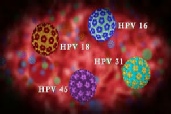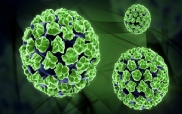
VirtualVillageMom
Reliable Information for Happier, Healthier Lives

How to Avoid HPV Infection
It is commonly known that the human papillomavirus (HPV) is spread from human to human, typically though some kind of sexual contact. What is not commonly known is that this virus is found attached to the head of the sperm, and that males are the reservoirs and vectors of this virus. There are more than 100 different types of HPV, but not all are known to cause disease. Studies have shown that most males carry HPV, whether or not they have been sexually active. Additionally, studies show that many males test positive for the virus at birth, and their birth mothers often carry a different strain.
According to the Center for Disease Control and Prevention (CDC), “all women who have ever had sex are at risk for HPV.” What can be confusing is that most of what we hear and read is that HPV is passed on between the two sexes. This is basically true. However, because males naturally carry the virus, they are mostly unaffected by it. This is most likely because there are billions of males in the world and only about 100 different types of HPV. Therefore, the likelihood that a male would come into contact with a woman or another male carrying a strain of the virus that he does not already have, is slim.
Females, on the other hand, are at much greater risk. The HPV is foreign to their bodies, and appears to enter only after sexual contact of some kind. If they come into contact with the wrong strain, 16 or 18, for example, they can develop cervical cancer years later. So how can you avoid getting HPV? If you are a male, chances are, you were born with it. As for females, unless you are willing to remain a virgin your entire life and avoid all sexual contact, you can’t avoid HPV altogether. But you can greatly reduce the possibility of developing cervical cancer as a result of an HPV infection. A healthy, fully developed immune system is more than capable of killing HPV naturally, and on its own; without the unnecessary risks associated with injections or medications. According to the CDC, “Most studies suggest that young age is at risk for infection.” What age is “young age” according to the CDC? Get the answer in Love, Sex, & Men: What Every Girl Should Know!
Reference
Center for Disease Control and Prevention: HUMAN PAPILLOMAVIRUS: http://www.cdc.gov/vaccines/pubs/pinkbook/downloads/hpv.pdf
By Donna R. Turner, MPH, CHES


